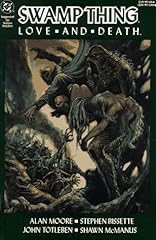
Swamp Thing Vol. 2 - Love and Death
By Alan Moore, Stephen R. Bissette and John Totleben
"Hey, that's Matthew the Raven!"
Pretty much my thought while reading the initial arc of this Swamp Thing volume. It was my thought because I am an ass. I never put two-and-two together and realized this Matt was Matthew the Raven from Neil Gaiman's The Sandman. Maybe it was obvious the whole time, maybe it was discussed in interviews and the like, but up until recently I hadn't read many Gaiman interviews and don't recall reading about this connection until seeing it mentioned in, I think, an Absolute Sandman edition.
So right away I had a small joy while re-reading these stories.
Anyway, Love and Death picks up right where The Saga of the Swamp Thing left off, which is to say it continues to make most mainstream comics look not only like work for children, but the work of children. This second collection of Alan Moore's legendary run picks up threads of a story that only existed in the background of that first volume and expands them into a story that is about as horrifying a thing as I've read. I'm talking specifically about Abby and Matthew and, and ....
bugs ...
For all the flack Moore gets for going too far with comics -- misguided critics claim he relies on cheap, easy shock -- stories like this one show that he does indeed know how to use restraint. His restraint is, in fact, what makes the horror here so damn HORRIBLE. He doesn't outright show us or even tell us of the terrible thing that leaves Abby a shaking, quaking mess, but we know what it is. Oh yes, we know. And holy hell does it ever leave you itchy and squirmy and grotesquely unsettled.
Deliciously well done arc, quite disturbing in every way.
Also in this volume, Moore dabbles a bit in the mythology of the afterlife, a bit of DC's world that is not quite consistent between this and Hellblazer and Lucifer and Sandman, all spinoffs of Swamp Thing in one way or another. Moore was among the first (the first?) to really start fleshing out the idea of what DC's heaven and hell are like. Here we get it in an embryonic form only, and it doesn't always jive with what came later. But whatever. It works despite that.
There is also a homage to Walt Kelly's Pogo near the end of this collection, one that has garnered a good deal of praise, and you know what? I don't care for it. It didn't grab me the first time I read it and didn't grab me this time, either. Mind you, it's an astonishing piece of writing. I marvel at Moore's amazing wordsmithing. He forges dozens of brand new, perfectly understandable nonsense words that actually have layered, nuanced meanings. From a writing perspective it's an stunning achievement.
But I just didn't enjoy reading it. I found it a chore to slog through the otherwise impressive wordcraft here. Was terribly heartbroken at the tragic ending made all the more tear-jerking for its mix of light cartoonishness and dark happenings, but overall this story just doesn't win me over the way it wins over many critics.
The final story in this volume is "Rites of Spring," which is the semi-infamous "Swamp Thing sex issue," only it really isn't that at all. That's a dumb tag thrown onto the story by dumb people who probably need to get out of their dumb house for a few hours or something. Anything to make them less dumb. This is more of a drug trip issue, which, let's be honest, almost nobody has ever done well.
I'm not enamored with the trippy part of this issue -- "psychedelic" stuff often seems like a good idea in theory, but in execution it rarely is -- but thankfully it's not the bulk of what makes it special. What makes it special is the mature way in which it explores its thematic material. "Rites of Spring" is a rather stirring look at the consummation of love between two people. It is the culmination of the courtship began in the first volume. When it gets into the stretch of pages with all sorts of crazy I find it loses me, but Moore's examination of the spiritual side of love is moving and ends on a gloriously upbeat note.
Most impressive about Love and Death is Moore's refusal to keep things easy for himself. Far from being content to find a good approach and milk it, he relentlessly challenged himself. He refused to tread the same ground and pushed himself to experiment every chance he got.
I still can't imagine what people were thinking as this was coming out. Must have been mind-blowing.
An earlier version of this review was originally posted at IMWAN.com.
Read my regular, everything-and-anything (usually on writing and music) blog right over here.





No comments:
Post a Comment